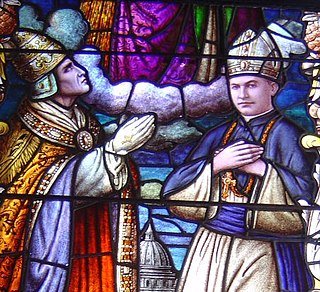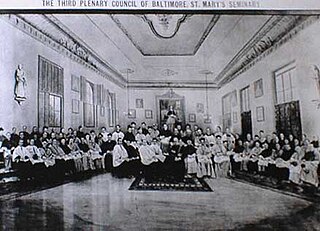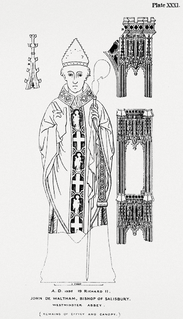An ecclesiastical court, also called court Christian or court spiritual, is any of certain courts having jurisdiction mainly in spiritual or religious matters. In the Middle Ages these courts had much wider powers in many areas of Europe than before the development of nation states. They were experts in interpreting canon law, a basis of which was the Corpus Juris Civilis of Justinian which is considered the source of the civil law legal tradition.

The Lord Chancellor, formally the Lord High Chancellor of Great Britain, is the highest ranking among those Great Officers of State which are appointed regularly in the United Kingdom, nominally outranking the Prime Minister. The Lord Chancellor is outranked only by the Lord High Steward, another Great Officer of State, who is appointed only for the day of coronations. The Lord Chancellor is appointed by the Sovereign on the advice of the Prime Minister. Prior to the Union there were separate Lord Chancellors for England and Wales, for Scotland and for Ireland.
A suffragan bishop is a bishop subordinate to a metropolitan bishop or diocesan bishop and, consequently, are not normally jurisdictional in their role. Suffragan bishops may be charged by a metropolitan to oversee a suffragan diocese. They may be assigned to an area which does not have a cathedral of its own.

A consistory court is a type of ecclesiastical court, especially within the Church of England where they were originally established pursuant to a charter of King William the Conqueror, and still exist today, although since about the middle of the 19th century consistory courts have lost much of their subject-matter jurisdiction. Each diocese in the Church of England has a consistory court.

Roger Northburgh was a cleric, administrator and politician who was Bishop of Coventry and Lichfield from 1321 until his death. His was a stormy career as he was inevitably involved in many of the conflicts of his time: military, dynastic and ecclesiastical.

An ordinary is an officer of a church or civic authority who by reason of office has ordinary power to execute laws.
A churchwarden is a lay official in a parish or congregation of the Anglican Communion, usually working as a part-time volunteer. Holders of these positions are ex officio members of the parish board, usually called a vestry, parochial church council, or in the case of a Cathedral parish the chapter.
The Diocese of Bath and Wells is a diocese in the Church of England Province of Canterbury in England.

The Plenary Councils of Baltimore were three national meetings of Catholic bishops in the United States in 1852, 1866 and 1884 in Baltimore, Maryland.
In canon law the confirmation of a bishop is the act by which the election of a new bishop receives the assent of the proper ecclesiastical authority.

John Waltham was a priest and high-ranking government official in England in the 14th century. He held a number of ecclesiastical and civic positions during the reigns of King Edward III and Richard II, eventually rising to become Lord High Treasurer, Lord Privy Seal of England and Bishop of Salisbury. He is buried in Westminster Abbey, London.
According to both Anglican and Catholic canon law, a cathedral chapter is a college of clerics (chapter) formed to advise a bishop and, in the case of a vacancy of the episcopal see in some countries, to govern the diocese during the vacancy. These chapters are made up of canons and other officers, while in the Church of England chapters now includes a number of lay appointees; in the Roman Catholic Church their creation is the purview of the pope. They can be "numbered", in which case they are provided with a fixed "prebend", or "unnumbered", in which case the bishop indicates the number of canons according to the rents. In some Church of England cathedrals there are two such bodies, the lesser and greater chapters, which have different functions. The smaller body usually consists of the residentiary members and is included in the larger one.

The Vicar General of the Diocese of Sodor and Man is an ecclesiastical law officer appointed by the Bishop of Sodor and Man.

Hilary (c. 1110–1169) was a medieval Bishop of Chichester in England. English by birth, he studied canon law and worked in Rome as a papal clerk. During his time there, he became acquainted with a number of ecclesiastics, including the future Pope Adrian IV, and the writer John of Salisbury. In England, he served as a clerk for Henry of Blois, who was the Bishop of Winchester and brother of King Stephen of England. After Hilary's unsuccessful nomination to become Archbishop of York, Pope Eugene III compensated him by promoting him to the bishopric of Chichester in 1147.
William Hamilton was deputy chancellor of England from 1286 to 1289, then Lord Chancellor from 1305 to his death on 20 April 1307. He was also Dean of York.
Trusteeism and the trustee system are practices and institutions within certain parishes of the Catholic Church in the United States, under which laypersons participate in the administration of Ecclesiastical Property. When laypersons are among the trustees, the Church seeks agreement with the civil authorities to have the property administered under principles of canon law.
A rector is, in an ecclesiastical sense, a cleric who functions as an administrative leader in some Christian denominations. In contrast, a vicar is also a cleric but functions as an assistant and representative of an administrative leader.

Guglielmo Borghetti is an Italian ordinary of the Catholic Church and the current Bishop of Albenga-Imperia. He is the former Bishop of Pitigliano-Sovana-Orbetello.











